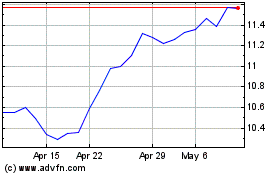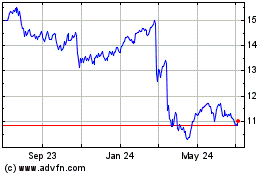Lysol Maker Bets Cleaning Boom Will Outlast Coronavirus -- Update
April 30 2020 - 1:12PM
Dow Jones News
By Saabira Chaudhuri
Consumers are cleaning their hands and homes more during the
coronavirus pandemic, a trend makers of big hygiene brands are
betting will outlast the Covid-19 crisis.
Lysol owner Reckitt Benckiser Group PLC on Thursday reported a
surge in first-quarter sales as shoppers stocked up on cleaning
products during lockdowns. While the company said it expects some
of that demand to unwind, like others in the industry, it also
thinks people will continue to clean more even when they are
spending less time at home.
"Over time we fully expect there will be more fundamental
changes happening as people will want to be in a cleaner
environment," said Reckitt Chief Executive Laxman Narasimhan. His
comments echo those of Dove soap owner Unilever PLC, which last
week said it expects the rise in interest for cleaning household
surfaces and hands to persist. Procter & Gamble Co. has also
said it expects consumers to clean more in the future.
Reckitt reported a 13.3% rise in like-for-like sales to GBP3.54
billion ($4.4 billion) for the first three months of the year,
driven by its hygiene and health divisions. Unilever and P&G
also posted gains in their corresponding operations for the
period.
Reckitt and Unilever have for years pushed behavioral marketing
campaigns trying to convince consumers to wash their hands more
often. The pandemic has offered a huge boost to those efforts, with
World Health Organization guidelines -- echoed by governments and
national health organizations -- recommending people regularly wash
their hands using soap for at least 20 seconds to protect
themselves.
A handwash challenge launched by Reckitt's Dettol brand on
TikTok, encouraging people to post videos of themselves dancing
while washing their hands, has been viewed more than 88 billion
times since mid-March, Mr. Narasimhan said.
The company's products got less-welcome publicity last week when
President Trump speculated that using disinfectants inside the body
could be an effective coronavirus treatment. The comments, later
walked back, prompted Reckitt to issue a statement warning against
ingesting its products.
To meet surging demand, Reckitt has ramped up production of hand
sanitizer and cleaning products in recent weeks. To boost
efficiency it has cut less popular variants of some brands,
allowing it to make bigger volumes of fewer products. The company
has also bought new equipment, repurposed production lines and
worked more closely with suppliers, Mr. Narasimhan said. In May
alone, Reckitt expects to make the same volume of hand sanitizer
that it made all of last year.
"We feared that Reckitt Benckiser's supply chain might not be up
to accommodating additional demand. We were very wrong," said RBC
analyst James Edwardes Jones.
However, Reckitt did caution that meeting higher demand while
practicing social distancing would result in higher costs for some
time. For instance, it has built makeshift cafes at some factories
and put in place more buses for workers traveling to its
plants.
Mr. Narasimhan also told analysts Thursday the company was
investing to capitalize on new growth opportunities as they emerge.
Lysol recently said it would work with Hilton Worldwide Holdings
Inc. to develop a more thorough cleaning regime for hotel rooms and
fitness centers that would reassure guests they are virus free.
Unilever has also adjusted its supply chain to capitalize on
greater demand for hygiene products. Last week the Anglo-Dutch
company said it had quickly rolled out soap and hand sanitizers
under its Lifebuoy antibacterial soap brand to 43 new countries. It
also sped up the launch of a new germ-killing line of products in
China called Botanical Hygiene.
P&G -- which owns Tide laundry detergent and Swiffer dusters
-- earlier this month said its five largest North American plants
produced and shipped 22% more cases in March than the average of
the prior 12 months.
In late February, the company launched Microban 24, a new brand
of cleaners it says work for 24 hours by binding bacteria-fighting
ingredients to surfaces.
On Thursday, Reckitt reported Lysol's like-for-like revenue
jumped more than 50% in the quarter in North America, helping drive
the region's hygiene unit's revenue on this basis up 20% overall.
In developing markets like-for-like hygiene revenue climbed by a
more modest 8% as rises in Latin America, the Middle East and South
East Asia offset declines in India, which has faced one of the
world's strictest lockdowns, hampering movement.
The company's over-the-counter health arm also reported higher
sales as consumers stocked up on drugstore staples, like the
Mucinex cough and cold brand in North America and Nurofen pain
relief in Europe, Australia and New Zealand.
Those gains offset a weaker performance for some of the
company's other products. Its infant formula unit reported a 2%
drop in like-for-like sales as weakness in China outweighed
stockpiling in North America. Reckitt's Durex brand, which mainly
sells condoms, also reported modest declines in sales.
Reflecting on weaker condom sales, Mr. Narasimhan said consumer
surveys show that an increase in proximity as couples stay at home
together has, in some countries, been outweighed by a rise in
anxiety about money, jobs and other issues that is dampening sexual
appetite.
In the U.K., 42% of people polled by Durex said they are having
less sex, compared with 29% saying they were having more, while in
Italy such behavior has "declined a lot," he said. The company
doesn't yet have a survey from the U.S.
Write to Saabira Chaudhuri at saabira.chaudhuri@wsj.com
(END) Dow Jones Newswires
April 30, 2020 12:57 ET (16:57 GMT)
Copyright (c) 2020 Dow Jones & Company, Inc.
Reckitt Benckiser (PK) (USOTC:RBGLY)
Historical Stock Chart
From Mar 2024 to Apr 2024

Reckitt Benckiser (PK) (USOTC:RBGLY)
Historical Stock Chart
From Apr 2023 to Apr 2024
